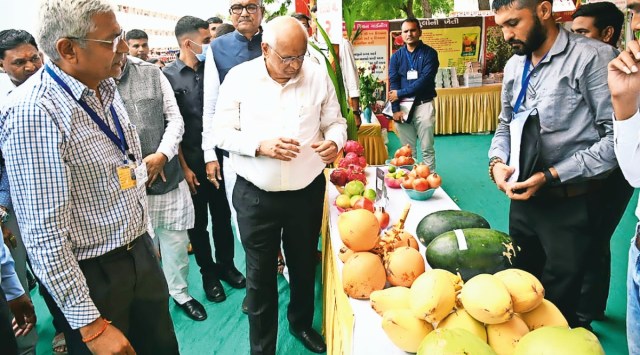Gujarat CM: Drone technology will solve labour shortage in agriculture
“The government has earmarked Rs 35 crore and a target of covering 1.4 lakh acres under this scheme has been set,” he added.
 CM Bhupendra Patel visits a stall in the horticulture crops exhibition in Dhrol of Jamnagar on Thursday. Express
CM Bhupendra Patel visits a stall in the horticulture crops exhibition in Dhrol of Jamnagar on Thursday. Express Chief Minister Bhupendra Patel Thursday said that the adoption of drone technology in agriculture will offer solutions for activities like applying fertilisers and pesticides and thereby address the issue of shortage of labour in the sector.
The chief minister said that the state government has earmarked Rs 35 crore for helping farmers purchase drones.
“Applying fertilisers is a labour-intensive process. Additionally, farmers have to spray pesticides to protect their crops (from pests). Generally, labourers apply fertlisers and spray pesticides. Drone technology will offer solutions for all such tasks. Additionally, we will find in drone technology the solution to the issue like shortage of labour,” the CM said.
“The government has earmarked Rs 35 crore and a target of covering 1.4 lakh acres under this scheme has been set,” he added.
The CM was addressing a public meeting in Dhrol town of Jamnagar district after laying foundation stone of a centre of excellence (CoE) for horticulture in Mavapar village in Dhrol taluka of Jamnagar.
The CM also laid the foundation stone of a primary processing centre (PPC) for horticulture crops in Mavapar. The CM also virtually laid the foundation stones of similar CoE-H in Miroli village in Daskroi taluka in Ahmedabad, and Mahamadpura village in Kapadvanj taluka of Kheda simultaneously.
He laid the foundation stones of similar PPCs for horticulture crops in Khandivav village in Jambughoda taluka of the Panchmahal, Deesa town in Banaskantha and at Kukma village near Bhuj in Kutch.
“Our objective is to see to it that farmers adopt modern farming practices so that agriculture becomes increasingly profitable and farmers’ income goes up. The primary (processing) centres being set up today are a step of the state government to create a value-addition chain in horticulture crops,” Patel said while addressing the farmers.
CoEs are model demonstration farms and nurseries being set up by the state government with the help of Israel under the Indo-Israel Agricultural Project.
Under the agreement signed with the government of India, the government of Israel is providing technical knowhow and necessary inputs like seeds etc for CoEs while the state government provides resources like fund, land, manpower for such establishments.
These centres typically have a plant/seedling nursery, a farm for demonstration of best cultivation techniques, modern irrigation and fertigation systems etc.
The addition of three CoEs will take the number of CoEs in the state to 10.
However, these are the first ever PPCs being launched by the state government. “These (primary processing) centres will provide services like grading, sorting, packing, storing, cold-chain, primary processing etc,” CM said.
Newsletter | Click to get the day’s best explainers in your inbox
Talking to The Indian Express after the event, Agriculture and Farmers Welfare Minister Raghvji Patel said that farmers are fast adopting dragon fruit or kamalam fruit in Jamnagar. “The acreage of dragon fruit is going up in Jamnagar. Therefore, the proposed CoE in Jamnagar will have this in mind even as vital fruit crops for Jamnagar are yet to be identified,” Patel said.
While each of the CoE will be developed at an estimated cost of Rs 3 lakh, each PPC will cost an average Rs 5 crore, officers of the state horticulture department said. The CM said that thanks to conducive policies of the state government, production of horticulture crops in the state has witnessed manyfold rise over the last 20 years.
The CM added that the state government has allotted Rs 10 lakh for promoting honeybee keeping and honey production in the state.
“We will hand over the PPCs to farmers producers organisations for operations and maintenance,” Parsottam Vaghasiya, director of horticulture in Gujarat said.







